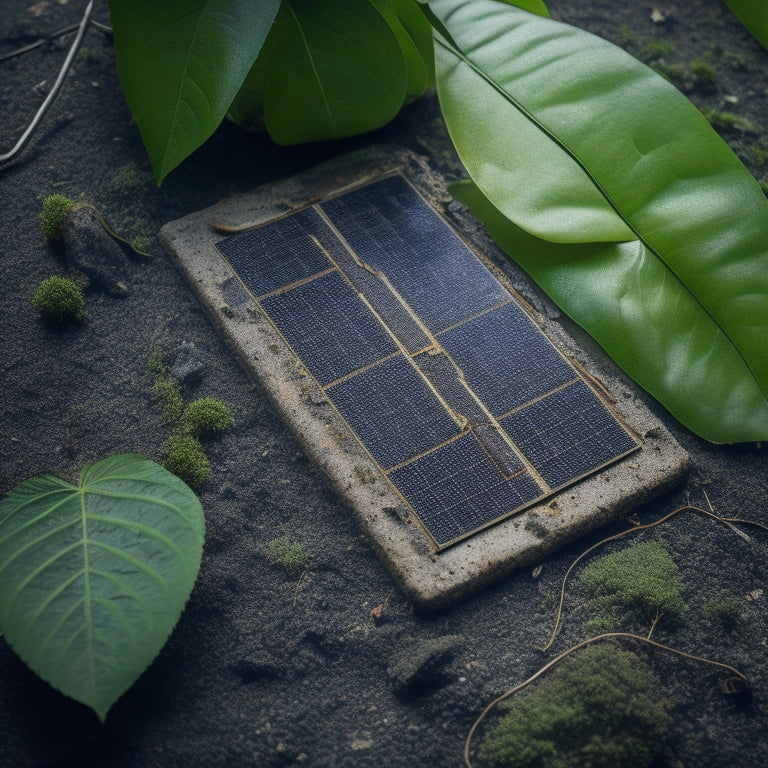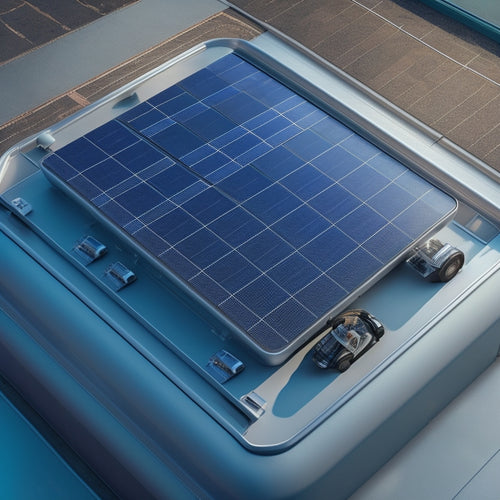
What Happens When You Neglect Cleaning Your Panels?
Share
When you neglect cleaning your solar panels, you're allowing dust, debris, and dirt to accumulate, silently eroding their energy output, efficiency, and lifespan. The buildup blocks sunlight, reducing energy production by up to 25% or more, and increases the risk of hotspots, premature aging, and system failure. Neglecting cleaning also leads to higher maintenance costs, and can even void your warranty. By ignoring regular cleaning, you're taking a significant risk with your investment. Discover the full extent of the consequences and how to avoid them.
Key Takeaways
• Neglecting cleaning leads to dust and debris accumulation, reducing energy output and system efficiency by up to 25% or more.
• Unclean panels are vulnerable to extreme weather conditions, risking damage, system failure, and costly repairs.
• Dirty panels increase the risk of hotspots, causing premature degradation, panel failure, and reduced energy output.
• Neglecting cleaning accelerates panel aging, causing premature degradation, cracks, and weaknesses, leading to reduced performance and lifespan.
• Failure to clean panels can nullify warranty and support, leaving consumers with costly maintenance and repair bills.
Dust and Debris Accumulation
As you neglect to clean your solar panels, dust and debris start accumulating on the surface, blocking sunlight and reducing energy output. This accumulation not only affects your energy production but also has a broader impact on your environment.
The trapped dust and debris can lead to poor air quality around your installation, compromising the health of you and those around you. Additionally, neglecting cleaning can leave your panels vulnerable to extreme weather conditions.
During storms, strong winds can dislodge loose debris, further damaging your panels and compromising their performance. This lack of storm preparedness can lead to costly repairs and even complete system failure.
Reduced Energy Output and Efficiency
Your solar panels' energy output and efficiency take a significant hit when you neglect cleaning, with a grimy surface reducing energy production by up to 25% or more. This decline in energy output directly affects your energy consumption, as your system struggles to meet your energy needs. As a result, you may notice an increase in your energy bills, which can be a significant financial burden.
The reduced energy output also affects your solar performance, as the panels' ability to convert sunlight into electricity is compromised. This decrease in solar performance can lead to a range of issues, including reduced system lifespan and increased maintenance costs.
Furthermore, the reduced energy output can also impact your carbon footprint, as you may need to rely on non-renewable energy sources to supplement your energy needs.
Increased Risk of Hotspots
Neglecting to clean your solar panels increases the risk of hotspots, which can lead to premature degradation of individual cells and even complete panel failure.
When debris and dirt accumulate on your panels, it can cause uneven heating, leading to hotspots. These hotspots can reduce the overall efficiency of your solar panel system and even cause permanent damage.
To identify hotspots, you can use thermal imaging or heat mapping techniques. These methods allow you to visualize the temperature distribution across your panels, helping you pinpoint areas of excessive heat.
By detecting hotspots early, you can take corrective action to clean the affected areas and prevent further damage.
If left unchecked, hotspots can lead to a cascade of problems, including reduced energy output, decreased panel lifespan, and even complete system failure.
Premature Aging of Panels
Dirty solar panels can accelerate the aging process of your system, causing premature degradation of the panels and compromising their overall performance. When you neglect cleaning your panels, you're allowing dirt and debris to accumulate, which can lead to material degradation over time. This degradation can cause your panels to lose their efficiency, reducing the amount of energy they're able to produce.
You may notice that your panels are more susceptible to ultraviolet (UV) exposure, which can further accelerate the aging process. As UV rays penetrate the panel's surface, they can cause the materials to break down, leading to cracks and weaknesses. This can lead to a significant decrease in your system's overall performance and lifespan.
Higher Maintenance Costs Later
By failing to clean your solar panels regularly, you'll likely face higher maintenance costs down the line, as accumulated dirt and debris can cause more extensive damage that requires costly repairs. This can lead to an expanded budget for maintenance, which may not have been anticipated in your initial solar panel investment.
| Consequence of Neglect | Financial Impact |
|---|---|
| Corrosion of panel components | $500 - $1,000 |
| Inverter replacement | $2,000 - $5,000 |
| Panel replacement | $5,000 - $10,000 |
| Sudden failures requiring emergency repairs | $1,000 - $3,000 |
| Increased frequency of repairs | $3,000 - $6,000 |
As you can see, neglecting to clean your solar panels can lead to a significant financial burden. By ignoring regular cleaning, you're risking sudden failures, corrosion, and other damage that can add up quickly. It's crucial to prioritize cleaning to avoid these costly consequences. By doing so, you'll ensure your solar panels operate efficiently and effectively, saving you money in the long run.
Impact on Inverter Performance
By neglecting the cleaning of your solar panels, you're likely to notice a significant impact on your inverter's performance.
The accumulation of dust and debris on your panels can lead to reduced energy output, increased heat buildup, and even premature wear on your inverter.
Understanding the effects of dust accumulation, heat buildup, and power output decrease on your inverter's performance is crucial for maximizing energy production.
Dust Accumulation Effects
Frequently, a thin layer of dust on your solar panels can reduce the inverter's maximum power output, leading to significant energy losses. You mightn't notice it immediately, but the effects of dust accumulation can be substantial.
When dust settles on your panels, it blocks sunlight from reaching the photovoltaic cells, reducing their ability to generate electricity. This, in turn, affects the inverter's performance, causing it to work less efficiently. As a result, you'll notice a decrease in your overall energy production.
The impact of dust accumulation goes beyond your energy output, though. Poor air quality in your area can exacerbate the issue, as airborne pollutants settle on your panels. This not only affects your energy production but also contributes to a broader environmental impact. By neglecting to clean your panels, you're inadvertently contributing to a larger problem.
It's crucial to prioritize regular cleaning to maintain peak inverter performance and minimize your environmental footprint.
Heat Buildup Consequences
When your solar panels heat up, their efficiency plummets, causing your inverter's performance to suffer, and you're likely to notice a significant drop in energy production. Heat buildup is a silent killer of your solar panel system's performance, and it's important to take proactive measures to mitigate its effects.
Thermal imaging can help identify hotspots on your panels, allowing you to pinpoint areas that need attention.
As an owner, you should prioritize heatwaves mitigation strategies to guarantee peak performance. High temperatures can reduce your inverter's lifespan, leading to costly repairs or even replacement. Additionally, heat buildup can cause your inverter to throttle its output, further reducing energy production.
Power Output Decrease
Your inverter's performance takes a direct hit when your solar panels' power output decreases, leading to a ripple effect that can greatly impact your entire solar panel system's efficiency. As energy loss increases, your inverter's ability to convert DC power to AC power is compromised. This can result in a significant drop in your system's overall performance metrics.
Here are 4 key ways a power output decrease affects your inverter's performance:
-
Reduced Energy Yield: With decreased power output, your inverter has less energy to convert, resulting in lower overall energy production.
-
Increased Energy Loss: A decrease in power output means more energy is lost as heat, further reducing your system's efficiency.
-
Decreased Inverter Efficiency: As power output decreases, your inverter's efficiency also decreases, leading to a higher energy loss.
- Reduced System Lifespan: Prolonged reduced performance can lead to a shorter lifespan for your entire solar panel system.
Voiding of Warranty and Support
Neglecting to clean your solar panels can render your warranty and support null and void, leaving you to foot the bill for costly repairs or even replacement. You might be thinking, 'But I've got a warranty, I'm protected!' Not if you don't follow the manufacturer's maintenance guidelines, you're not.
Failing to clean your panels can be seen as neglect, and that's a breach of contract. Manufacturer obligations to provide warranty and support are contingent upon your adherence to their maintenance schedule. If you don't hold up your end of the bargain, they're off the hook.
Consumer protections are in place to safeguard your investment, but they're not a free pass to neglect your responsibilities as a solar panel owner. By neglecting cleaning, you're not only risking damage to your panels but also forfeiting your right to manufacturer support.
Don't assume you're covered; make sure you understand the terms of your warranty and take proactive steps to maintain your solar panels. Cleanliness is key to ensuring your warranty remains valid and your system operates at peak performance.
Frequently Asked Questions
Can I Clean My Solar Panels Myself or Should I Hire a Pro?
You can clean your solar panels yourself, but consider hiring a pro for insurance benefits and to avoid professional liability; a pro's expertise guarantees a safe, efficient cleaning process, giving you peace of mind.
How Often Should I Clean My Solar Panels to Maintain Efficiency?
As dust and debris accumulate like a thick blanket, suffocating your solar panels, you should clean them every 6-12 months, considering seasonal variations, to prevent up to 25% energy loss and maintain peak efficiency.
Will Cleaning My Solar Panels With Water Damage the Electrical Components?
When you clean your solar panels with water, you won't damage the electrical components if you follow proper panel inspection guidelines, ensuring water resistance is maintained to prevent electrical shorts or corrosion.
Are There Any Specific Cleaning Products Recommended for Solar Panels?
When cleaning your solar panels, you'll want to opt for eco-friendly solutions and specialty brushes designed specifically for this purpose, as they won't damage the panels or harm the environment, ensuring peak energy output.
Can Dirty Solar Panels Cause a Fire or Electrical Shock Risk?
You might wonder, can dirty solar panels cause a fire or electrical shock risk? Fortunately, the risk is low, but it's not zero; a dirty panel can increase the risk of an Arc Fault, leading to an Electrical Surge, and potentially a fire.
Related Posts
-

Top Solar Panels for Car Battery Maintenance
When selecting top solar panels for car battery maintenance, consider high-efficiency models with high wattage output...
-

Why Electric Motorcycles Fail at Long-Distance Touring
You're likely familiar with the excitement of hitting the open road on an electric motorcycle, but you're also smart ...
-

Why Cities Need Smart Charging Infrastructure Now
You're about to experience a tidal wave of electric vehicles hitting your city's streets, and it's essential you're p...


